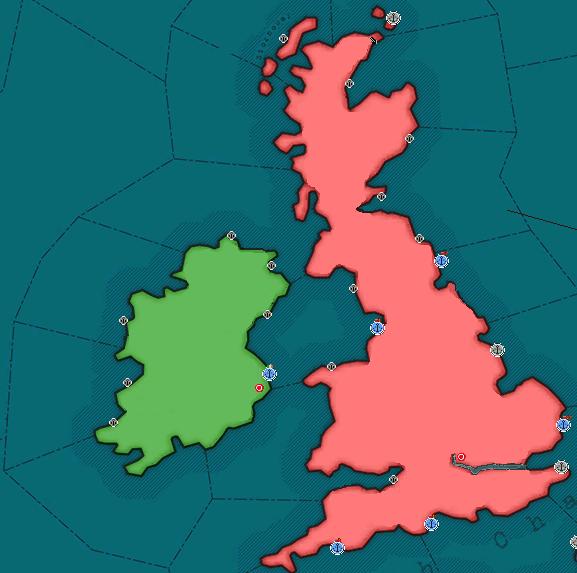Ireland
From Kaiserreich
| ||||
| Motto Céad Míle Fáilte: A hundred thousand welcomes | ||||
| Anthem Amhrán na bhFiann ("The Soldiers' Song") | ||||

| ||||
|
| ||||
| Official Languages | Irish, English | |||
| Capital | Dublin | |||
| Head of State | Michael Collins | |||
| Head of Government | Eoin O'Duffy | |||
| Establishment - Indipendence from United Kingdom | ||||
| Declared | April 24 1916 | |||
| Ratified | January 1 1922 | |||
| - Republic of Ireland | October 24 1925 | |||
| Government | Semi-presidential republic | |||
| Currency | Irish pound | |||
| Area | 84 116 km² | |||
| Population | About 4 millions | |||
Ireland is a country in West Europe. It is located on the island of the same name, also known as Emerald Isle (the second largest island of the British Isles).
Contents |
History
In mid-19th century the Green Isle was economically weak and easily troubled by crisis. Between 1846 and 1849 the potato harvest had been completely destroyed and a famine ravaged the land, leading to mass immigrations of Irish to the United States. Gradually, voices grew louder in Great Britain, calling for an independence of Ireland from the British Crown. In 1914 self government was supposed to commence, but it was delayed with the outbreak of the Weltkrieg. The disappointment about this delay culminated - supported by German intelligence - in the suppression of the Easter Uprising in 1916. Continued unrests further delayed the way to independence, but in 1921 a peace treaty was finally signed between the Irish rebels and the British government. According to this treaty, all of Ireland was ceded to the rebels, the new country to be established was named the ""Irish Free State"", it would remain part of the British Empire, and the King would be the Head of State. The Free State was established on January 1 1922 and Michael Collins became Taoiseach and leader of the Irish Free State. However, in July Collins officially proclaimed the establishment of the Kingdom of Ireland, calling to Prince Joachim of Prussia to rule the country. The British were outraged, but they were not willing to start a new war with Germany less than a year after the conclusion of the Weltkrieg. Prince Joachim accepted the offer with enthusiasm, claiming the regnal name of Brian III and announcing his decision to convert to Catholicism. However, his travel to Ireland was constantly postponed, and after more than three months of wait, Collins got rid of the Germans and abolished the monarchy in Ireland. On October 24 1922 Collins declared the end of the Kingdom of Ireland, and the birth of the Republic of Ireland. After more than ten years of rule, in 1936 Collins still leads the nation without any serious opposition, riding on a wave of unbeatable public support. Officially its President, unofficially Michael Collins has become dictator of the Second Republic.
Politics
President: Michael Collins
Taoiseach: Eoin O'Duffy
Minister for Foreign Affairs: Kevin O'Higgins
Chancellor of the Exchequer of Ireland: Oliver J. Flanagan
Minister for Justice, Equality and Law Reform: Gearóid Ó Cuinneagáin
Director of the Directorate of Intelligence: Sean MacEoin
Director of Military Operations: Richard Mulcahy
Commander-in-Chief of the Irish Republican Army: Eoin O'Duffy
Commander-in-Chief of the Irish Republican Navy: Eamon Broy
Commander-in-Chief of the Irish Republican Air Force: Piaras Béaslaí
Military
Army
The Irish Republican Army was gradually reduced in the last years, as Canada and Union of Britain seemed less threatening as before. As of now it consists of three division, guarding Dublin and Belfast. However, many call for an expansion of the army, as lately both the British Syndicalist and the British Exiles appeared inclined to choose a more militaristic approach towards each other. If war will be declared, Ireland might be caught in the middle and might even be forced to choose a side.
Navy and Air Force
A serious naval or air program has never been attempted. The Republican Navy consists of only two destroyers while the Republican Air Force is basically non-existent.
Foreign Relations
Good relations with Italian Federation, United States and Germany.
Unfriendly relations with Union of Britain and Canada.
Culture
After the declaration of independence from the United Kingdom, Irish culture was finally free to express itself, with its mix of Celtic and Catholic traditions. Much of the Irish calendar still today reflects the old pagan customs, with later Christian traditions also having significant influence.


